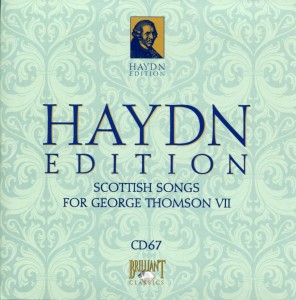 I’m embarrassed. And somewhat pissed.
I’m embarrassed. And somewhat pissed.
Last night, I forgot to rip more CDs from my Haydn Collection into iTunes.
In other words, yesterday’s CD was the last one from my wonderful box set by Brilliant Classics that I had on my laptop. I usually rip 8-10 at a crack just so I have a healthy reserve.
Wow. Time flies.
Fear not. YouTube to the rescue.
Thanks to a cat named Wolfgang Amadé Mozart who posts Haydn music to YouTube, I’m able to listen to today’s CD ,anyway.
Thank you, Wolfgang!
Here’s what I’m hearing today:
Track 1 (“Jenny dang the weaver”) is the perfect way to start, especially after the Aural interruptus I experienced this morning after sitting down with my cup of Light Roast. “Jenny dang the weaver” plays from 00:00 to 02:15 and it’s a delightfully jaunty tune, shared by soprano Lorna Anderson and tenor Jamie MacDougall. The title, alone, made me laugh. Not quite out loud. But it was a good sturdy internal chuckle.
Here are the lyrics to and a bit of information about this improbable tune, once again from the wonderful web site The Lied, Art Song, and Choral Texts Archive created by Emily Ezust:
At Willie’s wedding o’ the green,
The lasses, bonny witches,
Were buskit out in aprons clean,
And snaw-white Sunday’s mutches.
Auld Maysie bade the lads tak’ tent,
But Jock wad nae believe her;
And soon the fool his folly kent,
For — Jenny dang the weaver.
Sing, fa la la, etc.
In ilka countra-dance and reel,
Wi’ her he wad be babbin;
When she sat down, then he sat down,
And till her wad be gabbin:
Whare’er she gaed, or but or ben,
The coof wad never leave her,
Ay cacklin like a clockin hen;
But — Jenny dang the weaver.
Sing, fa la la, etc.
Quoth he, “My lass, to speak my mind,
“Good haith! I need na swither;
“You’ve bonny een, and gif you’re kind,
“I needna court anither.”
He hum’d and ha’d — the lass cried, Feugh!
And bade the fool no deave her;
Then snapt her thumb, and lap and leugh,
And — dang the silly weaver!
Sing, fa la la, &c.
GLOSSARY
Buskit = dressed
Mutches = linen caps
Tak’ tent = take heed
Ilka = every
Babbin = dancing
Gabbin = chatting
Or but or ben = outside or inside the house
Coof = blockhead, ninny
Clockin = clucking
Swither = hesitate
Feugh = Fly
Deave = deafen
Lap and leugh = leapt up and laughed
Submitted by Ferdinando Albeggiani
_________
If that song can’t put a smile on your face you’ve had too many Botox treatments.
The next Track (“Macgregor of Ruara’s lament”), unfortunately, isn’t a worthy successor. (To be fair, what could possibly compare to “Jenny dang the weaver”?)
“Macgregor” (which starts at 2:16 in the YouTube clip) is too lament-y.
And this is a good time to interject something.
When I think of Celtic music (does Scottish music qualify as Celtic?), I think of The Chieftains or Loreena McKennit. I think of rowdy pub songs with tin whistles and violins and claps and shouts from participants and an air of unbridled revelry so palpable that I can almost smell the Guinness and cigarette smoke.
For example, “The Dingle Set” from The Chieftains’ album Water From the Well:
Now that’s Celtic music.
That’s what I pictured in my mind’s eye (ear?) when I delved into Haydn’s Scottish Songs for George Thomson.
I realize life isn’t all Irish reels and tossing darts at the local pub. Sometimes, the tearjerker is needed to balance all that sunshine. For example, Loreena McKennit singing “Bonny Portmore“:
There’s something about her voice that makes me weep.
So I’m not not just an ale-and-darts kinda guy. I have a heart, too.
 For example, from my booth at Panera Bread, I am watching a white-haired grandfather and what appears to be his six- or seven-year-old granddaughter play with some kind of electronic device she holds in her hands.
For example, from my booth at Panera Bread, I am watching a white-haired grandfather and what appears to be his six- or seven-year-old granddaughter play with some kind of electronic device she holds in her hands.
She asks him questions and then turns the device around to show him the answer. It’s a very cute scene. Coupled with “Bonny Portmore” as the soundtrack it’s enough to make me bawl like a baby.
If that’s not sensitive, I don’t know what is.
Back to Haydn’s Scottish Songs for George Thomson.
It’s the same singers as on previous CDs:
Lorna Anderson and tenor Jamie MacDougall, both of whom actually are Scottish. They have fine voices.
It’s the same musicians as on previous CDs:
Haydn Trio Eisenstadt, which consists of:
Harald Kosik piano
Verena Stourzh violin
Hannes Gradwohl cello
Also, as with the previous CDs of Scottish Songs for George Thomson, this one was recorded where it was likely first performed, or even composed: Haydn Hall, Esterhazy Palace, Eisenstadt.
Track 3 (“Sir Patrick Spence”) begins at the 5:36 mark. It’s a song performed by soprano Lorna Anderson. I don’t care for it.
Track 4 (“Savourna deligh”) starts at the 9:26 mark.
The rest of today’s CD is about what I’ve come to expect from these songs. They’re not exactly rousing, and they’re not really emotional.
In other words, Haydn is no Loreena McKennitt when it comes to composing Celtic songs.
Afterward: As I was packing up my computer, winding up the power cord, stuffing the mouse and wireless keyboard into my Thule carrying case, the aforementioned grandfather with the tech-savvy granddaughter stopped beside me on his way to the rest room.
“Panerea’s my favorite office, too,” he said. “It was always great to get away from it all and come here.”
“You’re right,” I replied. “It is.”
Then we went our separate ways.
